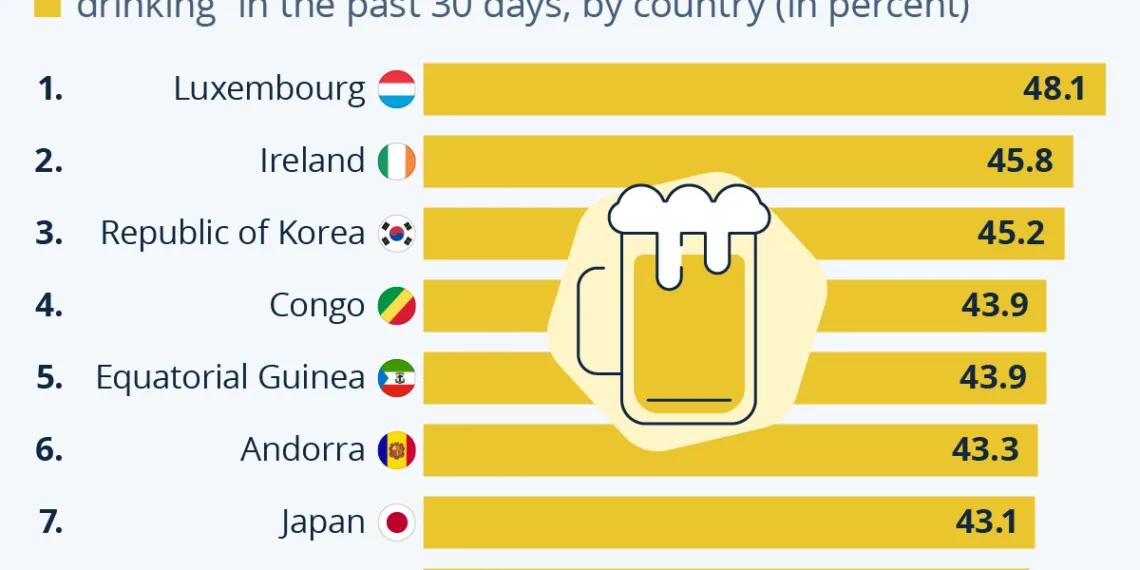The Global Landscape of Binge Drinking
Binge drinking is a pressing public health issue that affects countless individuals and communities across the globe. The phenomenon is often defined as consuming a substantial amount of alcohol in a single session, posing various risks to health, safety, and societal well-being.
Understanding Binge Drinking
Binge drinking typically refers to consuming more than six units of alcohol within a short time frame, often resulting in intoxication. Different countries have varied cultural attitudes toward drinking, and these attitudes can heavily influence binge-drinking rates. The World Health Organization (WHO) provides essential insights into global drinking patterns, revealing that specific nations experience substantially higher rates of binge drinking than others.
The Top Countries for Binge Drinking
According to the most recent data, Austria, Ireland, and Czechia (formerly known as the Czech Republic) have emerged as the frontrunners in binge drinking incidences worldwide. Let’s delve deeper into the drinking cultures and statistics of these countries.
Austria: A Culture of Celebration
Austria is known for its rich traditions that often involve the consumption of alcohol, particularly in social settings. Festivities, such as fairs and celebrations, frequently feature beer and wine, contributing to high consumption rates. The Austrian penchant for socializing means that drinking is often equated with enjoyment and camaraderie.
Ireland: The Spirit of the Irish
Ireland has long been associated with its vibrant pub culture. It’s a country where socializing over drinks is a significant part of the lifestyle. Irish people frequently engage in after-work drinks and weekend outings, leading to instances of excessive alcohol consumption. The stigma around excessive drinking in social contexts remains minimal, further fueling binge-drinking habits.
Czechia: A Brewing Tradition
Czechia boasts one of the highest beer consumption rates per capita in the world. The longstanding tradition of beer brewing, alongside the social significance of drinking, positions binge drinking as a common activity amongst the populace. The country’s historic breweries and festivals celebrate this culture, making excessive drinking more normalized.
Health Implications of Binge Drinking
The health repercussions associated with binge drinking cannot be understated. Frequent excessive consumption of alcohol can lead to:
- Chronic Health Conditions: Long-term effects include liver disease, cardiovascular issues, and addiction disorders.
- Mental Health Concerns: Alcohol misuse is often linked with anxiety, depression, and other mental health disorders.
- Increased Risk of Accidents: Binge drinking elevates the risk of accidents and injuries, particularly related to impaired judgment and coordination.
Sociocultural Influences on Drinking Habits
The escalation of binge drinking in certain countries can be attributed to various factors. These include but are not limited to:
Cultural Acceptance
In cultures where drinking is widely accepted and integrated into social activities, binge drinking becomes more common. Celebration rituals often involve alcohol, encouraging higher consumption rates. In contrast, societies with stricter attitudes toward drinking may see lower binge drinking prevalence.
Availability of Alcohol
Easily accessible alcohol can lead to increased consumption. In countries where alcohol is readily available, the temptation to binge can become overpowering, particularly during social gatherings or events.
Economic Factors
Socio-economic status impacts drinking habits as well. In regions where disposable income is higher, individuals may engage in binge drinking more readily. Conversely, lower economic status can correlate with alternatives to alcohol consumption.
The Role of Policy and Education
Tackling the issue of binge drinking necessitates a multi-faceted approach involving effective policy-making and educational initiatives. Strategies could include:
- Awareness Campaigns: Educating the public about the risks associated with binge drinking can help shape healthier attitudes toward alcohol consumption.
- Policy Regulation: Implementing stricter regulations on the sale and advertising of alcohol could deter binge drinking behavior, particularly among younger individuals.
- Community Programs: Creating supportive environments that promote responsible drinking and provide resources for those struggling with alcohol dependency is crucial.
As the statistics reveal, binge drinking remains a significant concern in many parts of the world. Understanding the cultural, social, and economic factors that contribute to this behavior is essential in addressing the associated health risks and crafting effective strategies for intervention.





